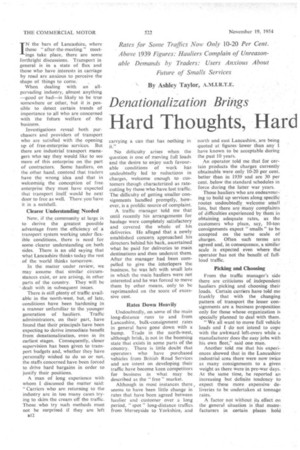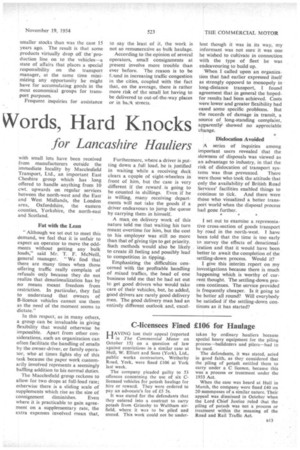Denationalization Brings
Page 46

Page 47

If you've noticed an error in this article please click here to report it so we can fix it.
Hard Thoughts, Hard Words, Hard Knocks
for Lancashire Hauliers
By Ashley Taylor, A.M.I.R.T.E. IN the bars of Lancashire, where those " after-the-meeting " meetings take place, there are some forthright discussions. Transport in general is in a state of flux and those who have interests in carriage by road are anxious to perceive the
shape of things to come. .
When dealing with an allpervading industry, almost anything —good or bad—is likely to be true somewhere or other, but it is possible to detect certain trends of importance to all who are concerned with the future welfare of the business.
Investigations reveal both purchasers and providers of transport who are satisfied with the opening up of free-enterprise services. But there are industrial transport managers who say they would like to see more of this enterprise on the part of contractors. Some hauliers, on the other hand, contend that traders have the wrong idea and that in welcomirig the conception of free enterprise they must have expected that transport itself would be next door to free as well. There you have it in a nutshell.
Clearer Understanding Needed
Now, if the community at large is to derive the greatest possible advantage from the efficiency of a transport system working under flexible conditions, there is need for some clearer understanding on both sides. There is an old saying that what Lancashire thinks today the rest of the world thinks tomorrow.
In the matter under review, we may assume that similar circumstances exist, or are arising, in other parts of the country. They will be dealt with in subsequent issues.
There is still plenty of traffic avail. able in the north-west, but, of late, conditions have been hardening in a manner unfamiliar to the younger generation of hauliers. Traffic administrators, on their part, have found that their principals have been expecting to derive immediate benefit from denationalization, even in its earliest stages. Consequently, closer supervision has been given to transport budgets and, whether they have personally wished to do so or not, the staffs concerned have been forced to drive hard bargains in order to justify their positions.
A -man of long experience with whom I discussed the matter said: "Carriers who are returning to the industry are in too many cases trying to skim the cream off the traffic. Those, who try such methods must not be surprised if they are left
carrying a can that has nothing in it."
No difficulty arises when the question is one of moving full toads and the desire to enjoy such favourable conditions of work has undoubtedly led to reductions in charges, welcome enough to customers though characterized as ratecutting by those who have lost traffic. The difficulty of getting smaller consignments handled promptly, however, is a prolific source of complaint.
A traffic manager told me that until recently his arrangements for haulage were completely satisfactory and covered the whole of his deliveries, He alleged that a newly established concern approached his directors behind his back, ascertained what he paid for deliveries to main destinations and then undercut them. After the manager had been compelled to give the interlopers the business, he was left with small lots in which the main hauliers were not interested and he was forced to move them by other means, only to be reprimanded on the score of excessive cost.
Rates Down Heavily
Undoubtedly, on some of the main long-distance runs to and from Lancashire, bulk-consignment rates in general have gone down with a bump. Trade in the north-west, although brisk, is not in the booming state that exists in some parts of the country. There is little doubt that operators who have purchased vehicles from British Road Services and are intent on developing their traffic have become keen competitors for business in what may be described as the " free " market.
Although in most instances there• seems to have been little change in rates that have been agreed between haulier and customer over a long period, "spot' long-distance -traffics from Merseyside to Yorkshire, and
north and east Lancashire, are being quoted at figures lower than any I have known to be acceptable during the past 10 years.
An operator told me that for certain products the charges currently obtainable were only 10-20 per cent. better than in 1939 and are 30 per cent. below the standard schedules in force during the latter war years.
Those hauliers who are endeavouring to build up services along specific routes undoubtedly welcome small lots, but there are many complaints of difficulties experienced by them in obtaining adequate rates, as the customers who place, say, 10-ton consignments expect " smalls " to be accepted on the same scale of charges. Often such terms are agreed and, in consequence, a similar scale is expected even where the operator has not the benefit of full load traffic.
Picking and Choosing
From the traffic manager's side there are criticisms of independent hauliers picking and choosing their loads. Certain carriers have told me frankly that with the changing pattern of transport the lesser consignments are a business proposition only for those whose organization is specially planned to deal with them.
'We all want to move full vehicle loads and I do not intend to cope with the awkward left-overs while a manufacturer does the easy jobs with his own fleet," said one man.
Another told me that his experiences showed that in the Lancashire industrial area there were now twice as many consignments to a given weight as there were in pre-war days. At the same time, he reported an increasing but definite tendency to expect these more expensive deliveries to be undertaken at tonnage rates.
A factor not Without its effect on the general situation is that manufacturers in certain places hold smaller stocks than was the case 15 years ago. The result is that some products virtually drop off the production line on to the vehicles—a state of affairs that places a special responsibility on the transport manager, at the same time minimizing any opportunity he might have for accumulating goods in the most economical groups for transport purposes.
Frequent inquiries for assistance with small lots have been received from manufacturers outside the immediate locality by Macclesfield Transport, Ltd., an important East Cheshire group which has long offered to handle anything from 10 cwt. upwards on regular services between the north-west and the East• and West Midlands, the London area, Oxfordshire, the eastern counties, Yorkshire, the north-east and Scotland.
Fat with the Lean
"Although we set out to meet this demand, we feel that it is unfair to expect an operator to move the oddments without getting any bulk loads," said Mr. T. F. McNeill, general manager. "We find that there are many times when those offering traffic really complain of refusals only because they do not realize that denationalization has by no means meant freedom from restriction. In particular, they fail to understand that owners of B-licence vehicles cannot use them as the need of the moment seems to dictate."
In this respect, as in many others, a group can be invaluable in giving flexibility that would otherwise be impossible. Apart from other considerations, such an organization can often facilitate the handling of smalls by the owner-driver, or family operator, who at times fights shy of this task because the paper work customarily involved represents a seemingly baffling addition to his normal duties.
The Macclesfield group reckons to allow for two drops at full-load rate; otherwise there is a sliding scale of supplements which rise as the size of consignment diminishes. Even where it is practicable to gain agreement on a supplementary rate, the extra expenses involved mean that, to say the least of it, the work is not so remunerative as bulk haulage.
According to the opinion of several operators, small consignments at present involve more trouble than ever before. The reason is to be found in increasing traffic congestion in the cities, coupled with the fact that, on the average, there is rather more risk of the small lot having to be delivered to out-of-the-way places or in back streets.
Furthermore, where a driver is putting down a full load, he is justified in waiting while a receiving deck clears a equple of eight-wheelers in front of him, but the case is very different if the reward is going to be counted in shillings. Even if he is willing, many receiving departments will not take the goods if a driver endeavours to jump the queue by carrying them in himself.
A man, on delivery work of this nature told me that waiting his turn meant overtime for him, but the cost to his employer was still no more than that of giving tips to get priority. Such methods would also be likely to create ill feeling and possibly lead to competition in tipping.
Emphasizing the difficulties concerned with the profitable handling of mixed traffics, the head of one business told me that he had set out to get good drivers who would take care of their vehicles, but, he added, good drivers are rarely good delivery men. The good delivery man had an entirely different outlook and, excel lent though it was in its way, my informant was not sure it was one he wished to cultivate in connection with the type of fleet he was endeavouring to build up.
When I called upon an organization that had earlier expressed itself as strongly opposed to monopoly in long-distance transport, I found agreement that in general the hopedfor results had been achieved. Costs were lower and greater flexibility had eased some specific problems. But the records of damage in transit, a source of long-standing complaint, apparently. showed no appreciable change.
Dislocation Avoided
A series of inquiries among important users revealed that the slowness of disposals was viewed as an advantage to industry, in that the risk of dislocation of transport sys tems was thus prevented. There were those who took the attitude that only the availability of British Road Services' facilities enabled things to continue to tick. And there were those who visualized a better transport world when the disposal process had gone further.
I set out to examine a representative cross-section of goods transport by road in the north-west. I have been told that the time is too early to survey the effects of denationalization and that it would have been better to await the completion of the settling-down process. Would it?
I give this interim report on my investigations because there is much happening which is worthy of current thought. The settling-down process continues. The service provided is frequently cheaper. Is it going to be better all round? Will everybody be satisfied if the settling-down continues as it has started?




































































































